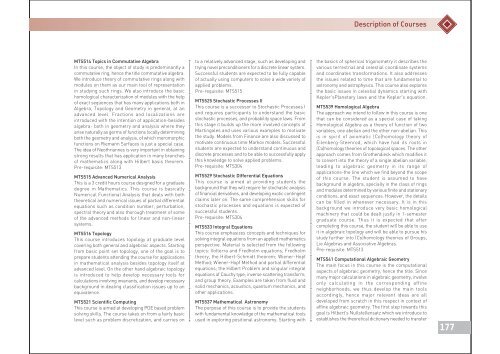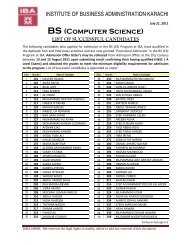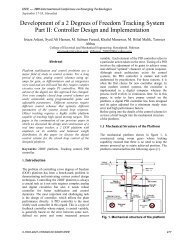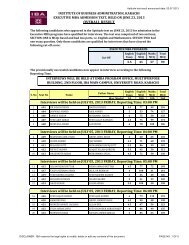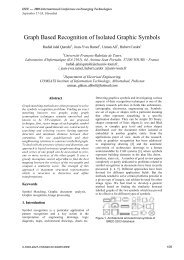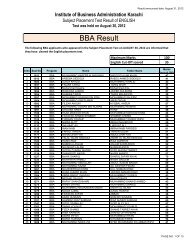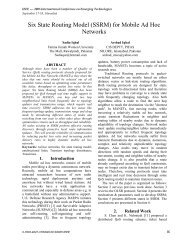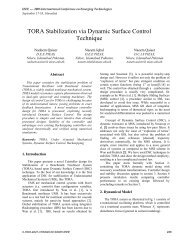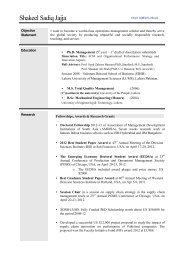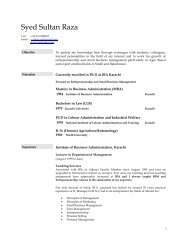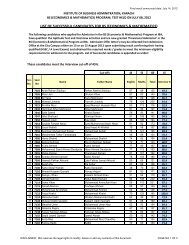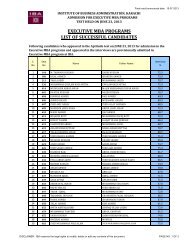Program Announcement 2013 - 14 - Institute of Business ...
Program Announcement 2013 - 14 - Institute of Business ...
Program Announcement 2013 - 14 - Institute of Business ...
Create successful ePaper yourself
Turn your PDF publications into a flip-book with our unique Google optimized e-Paper software.
Description <strong>of</strong> CoursesMTS5<strong>14</strong> Topics in Commutative AlgebraIn this course, the object <strong>of</strong> study is predominantly acommutative ring, hence the title commutative algebra.We introduce theory <strong>of</strong> commutative rings along withmodules on them as our main tool <strong>of</strong> representationin studying such rings. We also introduce the basichomological characterization <strong>of</strong> modules with the help<strong>of</strong> exact sequences that has many applications both inAlgebra, Topology and Geometry in general, at anadvanced level. Fractions and localizations areintroduced with the intention <strong>of</strong> application-besidesalgebra- both in geometry and analysis where theyarise naturally as germs <strong>of</strong> functions locally determiningboth the geometry and analysis, <strong>of</strong> which meromorphicfunctions on Riemann Surfaces is just a special case.The idea <strong>of</strong> Neothriannes is very important in obtainingstrong results that has application in many branches<strong>of</strong> mathematics along with Hilbert basis theorem.Pre-requisite: MTS513MTS515 Advanced Numerical AnalysisThis is a 3 credit hours course designed for a graduatedegree in Mathematics. This course is basicallyNumerical Functional Analysis that deals with boththeoretical and numerical issues <strong>of</strong> partial differentialequations such as condition number, perturbation,spectral theory and also thorough treatment <strong>of</strong> some<strong>of</strong> the advanced methods for linear and non-linearsystems.MTS516 TopologyThis course introduces topology at graduate levelcovering both general and algebraic aspects. Startingfrom basic point set topology, one <strong>of</strong> the goal is toprepare students attending the course for applicationsin mathematical analysis besides topology itself atadvanced level. On the other hand algebraic topologyis introduced to help develop necessary tools forcalculations involving invariants, and develop necessarybackground in dealing classification issues up to anequivalence.MTS521 Scientific ComputingThis course is aimed at developing PDE based problemsolving skills. The course takes on from a fairly basiclevel such as problem discretization, and carries onto a relatively advanced stage, such as developing andtrying novel preconditioners for a discrete linear system.Successful students are expected to be fully capable<strong>of</strong> actually using computers to solve a wide variety <strong>of</strong>applied problems.Pre-requisite: MTS515MTS525 Stochastic Processes IIThis course is a successor to Stochastic Processes Iand requires participants to understand the basicstochastic processes, and probability space laws. Fromthis stage it builds up the more involved concepts <strong>of</strong>Martingales and uses various examples to motivatethe study. Models from Finance are also discussed tomotivate continuous time Markov models. Successfulstudents are expected to understand continuous anddiscrete processes and to be able to successfully applythis knowledge to solve applied problems.Pre-requisite: MTS304MTS529 Stochastic Differential EquationsThis course is aimed at providing students thebackground that they will require for stochastic analysis<strong>of</strong> financial derivatives, and developing exotic contingentclaims later on. The same comprehension skills forstochastic processes and equations is expected <strong>of</strong>successful students.Pre-requisite: MTS304MTS533 Integral EquationsThis course emphasizes concepts and techniques forsolving integral equations from an applied mathematicsperspective. Material is selected from the followingtopics: Volterra and Fredholm equations, Fredholmtheory, the Hilbert-Schmidt theorem; Wiener-HopfMethod; Wiener-Hopf Method and partial differentialequations; the Hilbert Problem and singular integralequations <strong>of</strong> Cauchy type; inverse scattering transform;and group theory. Examples are taken from fluid andsolid mechanics, acoustics, quantum mechanics, andother applications.MTS537 Mathematical AstronomyThe purpose <strong>of</strong> this course is to provide the studentswith fundamental knowledge <strong>of</strong> the mathematical toolsused in exploring positional astronomy. Starting withthe basics <strong>of</strong> spherical trigonometry it describes thevarious terrestrial and celestial coordinate systemsand coordinates transformations. It also addressesthe issues related to time that are fundamental toastronomy and astrophysics. This course also exploresthe basic issues in celestial dynamics starting withKepler'sPlanetary laws and the Kepler's equation.MTS539 Homological AlgebraThe approach we intend to follow in this course is onethat can be considered as a special case <strong>of</strong> takingHomological Algebra as a theory <strong>of</strong> function <strong>of</strong> twovariables, one abelian and the other non-abelian. Thisis in spirit <strong>of</strong> axiomatic (Co)homology theory <strong>of</strong>Eilenberg-Steenrod, which have had its roots in(Co)homology theories <strong>of</strong> topological spaces. The otherapproach comes from Grothendieck which modifies itto convert into the theory <strong>of</strong> a single abelian variable,leading to algebraic geometry in its range <strong>of</strong>applications-the line which we find beyond the scope<strong>of</strong> this course. The student is assumed to havebackground in algebra, specially in the class <strong>of</strong> ringsand modules determined by various finite and stationaryconditions, and exact sequences. However, the detailscan be filled in whenever necessary. It is in thisbackground we introduce very basic homologicalmachinery that could be dealt justly in 1-semestergraduate course. Thus it is expected that aftercompleting this course, the student will be able to useit in algebraic topology and will be able to pursue hisstudy further into (Co)homology theories <strong>of</strong> Groups,Lie Algebras and Associative Algebras.Pre-requisite: MTS513MTS541 Computational Algebraic GeometryThe main focus in this course is the computationalaspects <strong>of</strong> algebraic geometry, hence the title. Sincemany major calculations in algebraic geometry, involveonly calculating in the corresponding affineneighborhoods, we thus develop the main toolsaccordingly, hence major relevant ideas are alldeveloped from scratch in this respect in context <strong>of</strong>affine algebraic geometry. The first step towards thisgoal is Hilbert's Nullstellensatz which we introduce toestablishes the theoretical dictionary needed to transfer177


